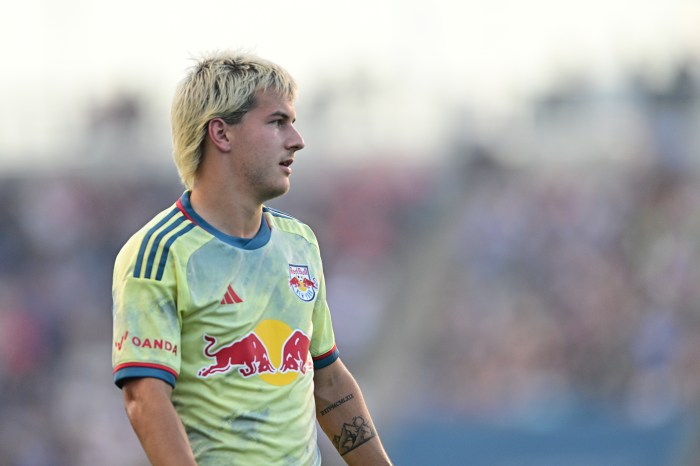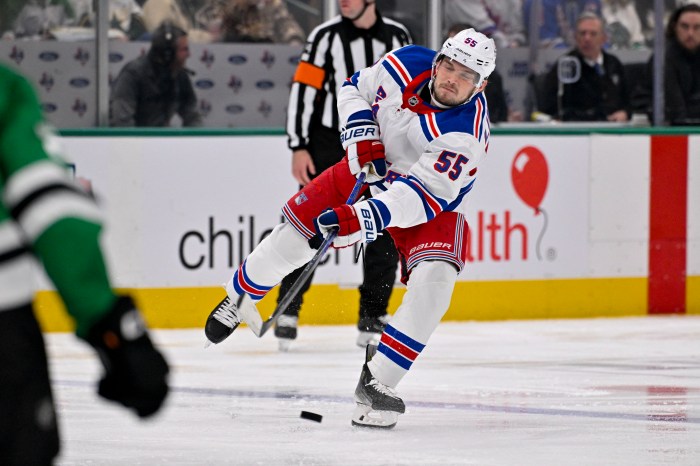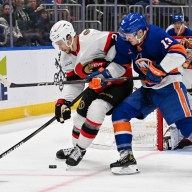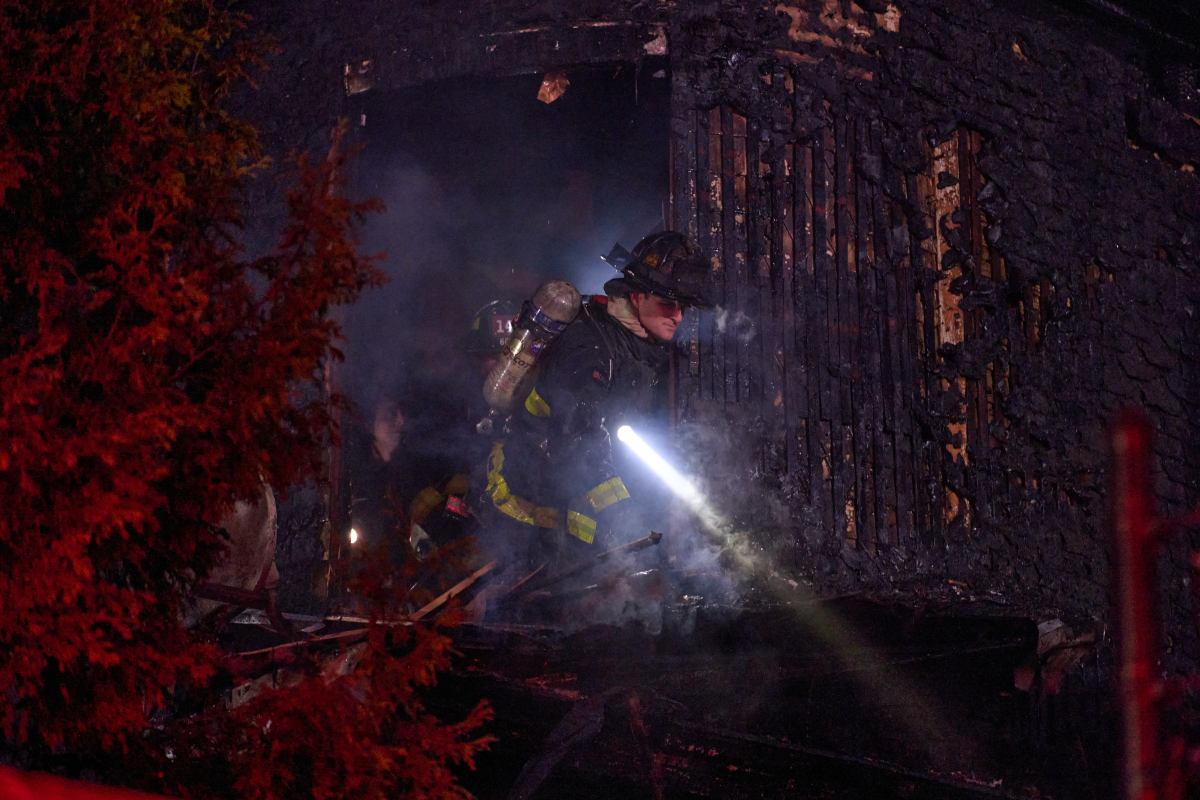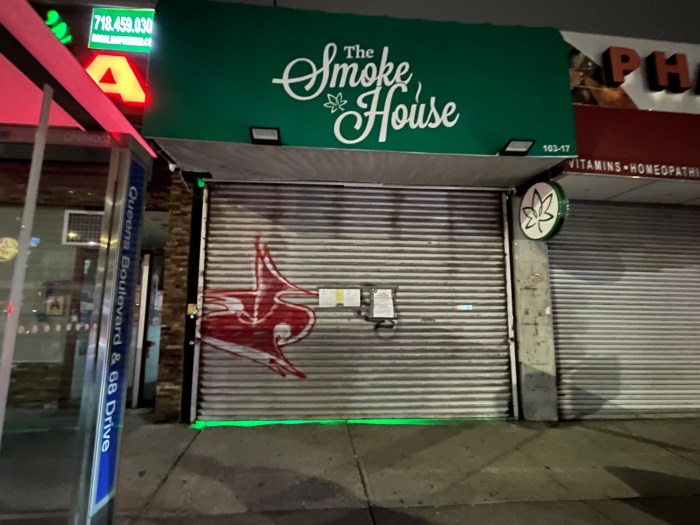
American Pharoah is the 35th horse to enter the Belmont Stakes with a chance at winning horse racing’s Triple Crown. Eleven of those horses succeeded. These 23 did not.
1932: Burgoo King (Did not run)
There are conflicting stories why Burgoo King (named for a grocer famous for his burgoo stew) passed on the Belmont. One report said that his handlers did not file the required paperwork, while other sources say that an ankle injury kept him out. The winning horse was Faireno.
1936: Bold Venture (Did not run)
Bold Venture won the Kentucky Derby without having a previous stakes victory to his record, and with an apprentice jockey aboard. He won the Preakness by a nose two weeks later, but prior to the Belmont Stakes he suffered a bowed tendon and was retired. The winning horse was Granville.
1944: Pensive (2nd)
The first colt to win the first two legs of the Triple Crown, then lose the third. Pensive was in the lead of the Belmont when 16-1 shot Bounding Home inched by a few strides from the wire to win by less than half a length. In eight more career starts, Pensive never won again.
1958: Tim Tam (2nd)
Tim Tam, an overwhelming 3-20 betting favorite in the Belmont, was in a tight duel with Cavan. Cavan took a slight lead coming out of the final turn, but coming down the home stretch Tim Tam fractured a sesamoid bone and hobbled across the finish line in second place as Cavan won. The injury ended Tim Tam’s racing career.
1961: Carry Back (7th)
Carry Back, a 2-5 favorite, was well off the early pace — as he usually was in his races, but this time there was no late charge and he finished seventh, 15 lengths behind Sherluck — a 65-1 longshot. It was later revealed that Carry Back raced with an injury to his left front ankle.
1964: Northern Dancer (3rd)
The 1964 Belmont Stakes, run at Aqueduct Racetrack while Belmont Park underwent renovations, was one of Northern Dancer’s few failures. Until Secretariat in 1973, Northern Dancer had run the fastest Kentucky Derby ever, 2 minutes flat and had won 14 of 18 career starts. Jockey Bill Hartack said the 1 1/2-mile Belmont distance was too much for the small horse and he was right. Northern Dancer never mounted a strong challenge and finished third, six lengths behind winner Quadrangle. Roman Brother was second.
1966: Kauai King (4th)
Run again at Aqueduct because of renovations at Belmont Park, Kauai King led the field into the final turn but tired in the stretch as Amberoid won by two lengths over Buffle. Advocator nipped Kauai King at the finish line for third place.
1968: Forward Pass (2nd)
Forward Pass was in position for the Triple Crown without having finished first in the Kentucky Derby. He was declared the winner when Dancer’s Image (pictured above) was disqualified. In the Belmont, Forward Pass showed the way from the start with Stage Door Johnny — who did not run in the Derby or Preakness — well back. But Stage Door Johnny began to move on backstretch and was second entering the final turn. He ran down the tiring leader in the stretch, passing him at the sixteenth pole and won by a length and a half.
1969: Majestic Prince (2nd)
Majestic Prince edged out Arts and Letters in both the Kentucky Derby and Preakness Stakes, but after the Preakness trainer Johnny Longden said the colt had an injury to his front right tendon and would not run in the Belmont. Owner Frank McMahon overruled his trainer. Arts and Letters moved into the lead after a mile. Caught in traffic in the backstretch, Majestic Prince moved outside and tried to catch the front-runner down the stretch. Arts and Letters fought off the challenge, and won by 5 1/2 lengths. It was Majestic Prince’s first defeat in 10 starts, and he never raced again.
1971: Canonero II (4th)
The Triple Crown bid helped attract a crowd of 81,036, then a record for Belmont Park. Canonero II led out of the first turn and widened the lead to two lengths in the backstretch. Pass Catcher pulled even at the five-sixteenths pole and the two colts ran together until the quarter pole where Pass Catcher raced ahead by a length. Pass Catcher held off Jim French in the stretch, and Bold Reason just edged out Canonero II for third.
1979: Spectacular Bid (3rd)
Gallant Best broke fast and held the lead until Spectacular Bid caught him midway along the backstretch. Bid widened the lead to three lengths by the top of the stetch, but Coastal was coming along the rail and took the lead near the final furlong. Golden Act ran down Spectacular Bid three strides from the wire to finish second.
1981: Pleasant Colony (3rd)
Pleasant Colony broke cleanly, but trailed the field for the first half-mile. Summing went to the rail from the outset to save ground and took the lead in the backstretch. He was four lengths in front as he turned for home with a quarter-mile to go, and settled down the stretch to hold off Highland Blade by a neck with Pleasant Colony another 1 1/2 lengths behind.
1987: Alysheba (4th)
Medication may have been a factor as Alysheba raced without Lasix (an antibleeding medication widely believed to improve performance). Alysheba used the drug in winning the Derby and Preakness, but at the time the use of Lasix was prohibited in New York and the Triple Crown hopeful ran fourth most of the way in this race. He finished 14 1/4 lengths behind Bet Twice, with Cryptoclearance second by a nose over Gulch.
1989: Sunday Silence (2nd)
Easy Goer, runner-up in the Kentucky Derby and Preakness, roared past Sunday Silence on the turn for home and pulled away in the stretch. The winning time of 2:26.01 was the second-fastest Belmont ever, behind only Secretariat’s 2:24 in 1973. Le Voyageur, who led for a mile, hung on for third.
1997: Silver Charm (2nd)
After winning the Kentucky Derby and the Preakness in photo finishes, Silver Charm was overtaken in the final 100 yards and lost the Belmont to Touch Gold. Silver Charm seemed to have won the race in the homestretch when he caught and passed Free House, but Touch Gold rushed past on the outside and won by three-quarters of a length. In describing the final seconds of the race, Silver Charm jockey Gary Stevens said, “I saw a shadow out of the corner of my eye. It was Touch Gold, and Silver Charm never saw him.”
1998: Real Quiet (2nd)
Real Quiet and Victory Gallop ran 1-2 in the Derby and the Preakness, but in the Belmont things were reversed. Real Quiet ran with the leaders throughout, and rounding the final turn he shot from sixth place to third, and then opened a lead of four lengths at the quarter pole. But Victory Gallop emerged with a rush in the stretch and the two colts raced together for the final 200 yards. A photo finish showed that Victory Gallop bobbed ahead by a nose at the wire. Afterwards, stewards said that had Real Quiet won, he probably would have been disqualified for brushing the winner twice.
1999: Charismatic (3rd)
The rivalry between Charismatic and Menifee had been compared to that of Affirmed and Alydar in 1978 as they ran 1-2 in the Derby and Preakness. In the Belmont, Charismatic took the lead in the final furlong, but faded and lost the lead to Lemon Drop Kid with one-eighth mile to go. Lemon Drop Kid won by a nose over Vision and Verse. After finishing third, Charismatic jockey Chris Antley sensed something wrong, jumped off and held up the colt’s left front leg, which was broken in two places. Antley probably helped to save Charismatic’s life, as the horse underwent career-ending surgery the next day.
2002: War Emblem (8th)
After stumbling at the break, War Emblem regained his footing and ran on but was bottled up on the inside in fourth place well into the backstretch. War Emblem advanced to second approaching the mile marker and for an instant was in front. But the Triple Crown hopeful was finished early and faded to eighth as Sarava — at 70-1 the longest shot to ever win the Belmont — won a head-to-head battle with Medaglia d’Oro by a half-length with Sunday Break third.
2003: Funny Cide (3rd)
Funny Cide, a New York-bred gelding, was the overwhelming favorite, but heavy rains left Belmont a sea of slop that day and Funny Cide seemed to have gotten the worst of the conditions by holding the rail (where the muck was deepest) the entire way. Funny Cide broke cleanly to an early lead with Empire Maker tracking outside as they went into the backstretch. Funny Cide still led into the far turn, but Jerry Bailey made his move aboard Empire Maker at the quarter pole and pulled ahead. In the final 100 yards it was Ten Most Wanted who challenged and finished second by three-quarters of a length. It was another 4 3/4 lengths back to third for Funny Cide — the fifth Derby-Preakness winner in seven years to come up short of the Triple Crown.
2004: Smarty Jones (2nd)
Smarty Jones moved up three wide to contest the early pace, then fought off the challenges of Eddington and Rock Hard Ten as they made runs at the favorite into the second turn. Purge faded badly from his early efforts and Smarty Jones took the lead on the backstretch. Smarty Jones grabbed a 3 1/2-length edge as the field turned for home, but Birdstone — who began his drive at the quarter pole — steadily closed and surged past the leader 70 yards from the wire.
2008: Big Brown (DNF)
Big Brown, the 3-10 favorite, could not validate trainer Rick Dutrow’s boasts that he would win the Triple Crown when he finished last in the Belmont. Big Brown loped along four-wide in third place on the backstretch, seemingly waiting to pounce. But when jockey Kent Desormeaux asked his undefeated colt to fire coming into the final turn, Big Brown felt lifeless and was drifting wide and Desormeaux pulled up. Far ahead of Big Brown, 38-1 shot Da’ Tara completed a wire-to-wire victory by 5 lengths over Denis of Cork. When asked what happened to Big Brown, Dr. Larry Bramlage, the on-call veterinarian, said: “I have no idea. He looked fine.”
2012: I’ll Have Another (Did not start)
I’ll Have Another was scratched from the Belmont the day before the race and retired because of a tendon injury. Union Rags overtook front-running Paynter eight strides from the wire and edged away to win by a neck.
2014: California Chrome (T-4th)
California Chrome displayed good early speed after a rough start in which he appeared to be bumped hard and may have been kicked coming out of the gate. He was second into the first turn behind Commissioner, but all along the backstretch California Chrome found himself blocked on the rail and slipped to fifth when making a wide rally into the third turn. He made a four-wide sweep at the top of the stretch as Tonalist nosed into the lead. In the sprint to the wire, California Chrome came up empty as Tonalist drove hard to edge Commissioner at the wire, followed by Medal Count. California Chrome and Wicked Strong were even for fourth.
Read more: Christian Scott shines in MLB debut, earning widespread praise.




